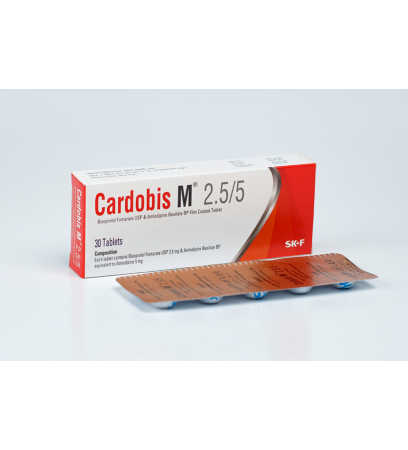Cardobis M Tablet 2.5 mg+5 mg
- Brand:Eskayef Pharmaceuticals Ltd
- Product Code: Bisoprolol Fumarate + Amlodipine Besilate
- Availability: In Stock
-
6.00Tk.
This product has a minimum quantity of 10
Indications
Bisoprolol & Amlodipine combination is indicated for the treatment of hypertension as substitution therapy in patients adequately controlled with the individual products given concurrently at the same dose level as in the combination, but as separate tablets
Pharmacology
This consists of Amlodipine and Bisoprolol Fumarate. Amlodipine is a dihydropyridine calcium antagonist that inhibits the transmembrane influx of calcium ions into vascular smooth muscle and cardiac muscle. The contractile processes of cardiac muscle and vascular smooth muscle are dependent upon the movement of extracellular calcium ions into these cells through specific ion channels. Amlodipine inhibits calcium ion influx across cell membranes selectively, with a greater effect on vascular smooth muscle cells than on cardiac muscle cells. Amlodipine acts directly on vessels to cause a reduction in peripheral vascular resistance and reduction in blood pressure.
Bisoprolol Fumarate is a synthetic, beta1-selective (cardioselective) adrenoceptor blocking agent, lacking intrinsic sympathomimetic and relevant membrane stabilizing activity. It only shows low affinity to the beta2 receptor of the smooth muscles of bronchi and vessels as well as to the beta2-receptors concerned with metabolic regulation. Therefore, bisoprolol is generally not to be expected to influence airway resistance and beta2-mediated metabolic effects. Its beta1-selectivity extends beyond the therapeutic dose range.
Bisoprolol Fumarate is a synthetic, beta1-selective (cardioselective) adrenoceptor blocking agent, lacking intrinsic sympathomimetic and relevant membrane stabilizing activity. It only shows low affinity to the beta2 receptor of the smooth muscles of bronchi and vessels as well as to the beta2-receptors concerned with metabolic regulation. Therefore, bisoprolol is generally not to be expected to influence airway resistance and beta2-mediated metabolic effects. Its beta1-selectivity extends beyond the therapeutic dose range.
Dosage & Administration
One tablet once daily in patients whose blood pressure is adequately controlled with separately administered monocomponent products of the same doses as the recommended fixed-dose combination.
Interaction
Combinations not recommended: Calcium antagonists of the verapamil and diltiazem type, centrally-acting antihypertensive drugs.
Combinations to be used with caution: Strong or moderate CYP3A4 inhibitors, CYP3A4 inducers, simvastatin, Tacrolimus, Cyclosporine, class I antiarrhythmic drugs, class III antiarrhythmic drugs, parasympathomimetic drugs, topical beta-blockers (e.g. eye drops), insulin and oral antidiabetic drugs, anesthetic agents, digitalis glycosides, non-steroidal anti-inflammatory drugs (NSAIDs), sympathomimetic agents, antihypertensive agents and other drugs with blood pressure lowering potential.
Combinations to be considered: Mefloquine, Rifampicin, Ergotamine derivatives, MAO inhibitors (except MAO-B inhibitor).
Combinations to be used with caution: Strong or moderate CYP3A4 inhibitors, CYP3A4 inducers, simvastatin, Tacrolimus, Cyclosporine, class I antiarrhythmic drugs, class III antiarrhythmic drugs, parasympathomimetic drugs, topical beta-blockers (e.g. eye drops), insulin and oral antidiabetic drugs, anesthetic agents, digitalis glycosides, non-steroidal anti-inflammatory drugs (NSAIDs), sympathomimetic agents, antihypertensive agents and other drugs with blood pressure lowering potential.
Combinations to be considered: Mefloquine, Rifampicin, Ergotamine derivatives, MAO inhibitors (except MAO-B inhibitor).
Contraindications
Acute heart failure or during episodes of heart failure decompensation, obstruction of the outflow tract of the left ventricle (e.g. high grade aortic stenosis), cardiogenic shock, second or third degree AV block, sick sinus syndrome, sinoatrial block, symptomatic bradycardia or hypotension, severe bronchial asthma, severe forms of peripheral arterial occlusive disease or severe forms of Raynaud’s syndrome, untreated phaeochromocytoma metabolic acidosis, hypersensitivity to bisoprolol, amlodipine, dihydropyridine derivates or to any of the excipients.
Side Effects
Common: Dizziness, headache, somnolence, palpitations, flushing, feeling of coldness or numbness in the extremities, gastrointestinal complaints such as nausea, vomiting, diarrhea, constipation, abdominal pain; edema (e.g. ankle edema), fatigue.
Uncommon: Insomnia, mood changes (incl. anxiety), depression, sleep disorders, hypaesthesia, paresthesia, dysgeusia, tremor, visual disturbances (incl. diplopia), tinnitus, AV conduction disturbances, worsening of pre existing heart failure, bradycardia, hypotension, syncope, dyspnea, bronchospasm in patients with bronchial asthma or a history of obstructive airway disease, rhinitis, dyspepsia, dry mouth, alopecia, purpura, skin discoloration, pruritus, exanthema, arthralgia, myalgia, muscular weakness, muscle cramps, back pain, micturition disorder, nocturia, pollakisuria, potency disorders, gynecomastia, asthenia, chest pain, pain, malaise, weight increase, weight decrease.
Rare: Allergic reactions mainly affecting the skin, nightmares, hallucinations, confusion, decreased tear secretion, hearing disorders, allergic rhinitis, hepatitis, increased triglycerides, increased liver enzymes (ALAT, ASAT).
Uncommon: Insomnia, mood changes (incl. anxiety), depression, sleep disorders, hypaesthesia, paresthesia, dysgeusia, tremor, visual disturbances (incl. diplopia), tinnitus, AV conduction disturbances, worsening of pre existing heart failure, bradycardia, hypotension, syncope, dyspnea, bronchospasm in patients with bronchial asthma or a history of obstructive airway disease, rhinitis, dyspepsia, dry mouth, alopecia, purpura, skin discoloration, pruritus, exanthema, arthralgia, myalgia, muscular weakness, muscle cramps, back pain, micturition disorder, nocturia, pollakisuria, potency disorders, gynecomastia, asthenia, chest pain, pain, malaise, weight increase, weight decrease.
Rare: Allergic reactions mainly affecting the skin, nightmares, hallucinations, confusion, decreased tear secretion, hearing disorders, allergic rhinitis, hepatitis, increased triglycerides, increased liver enzymes (ALAT, ASAT).

